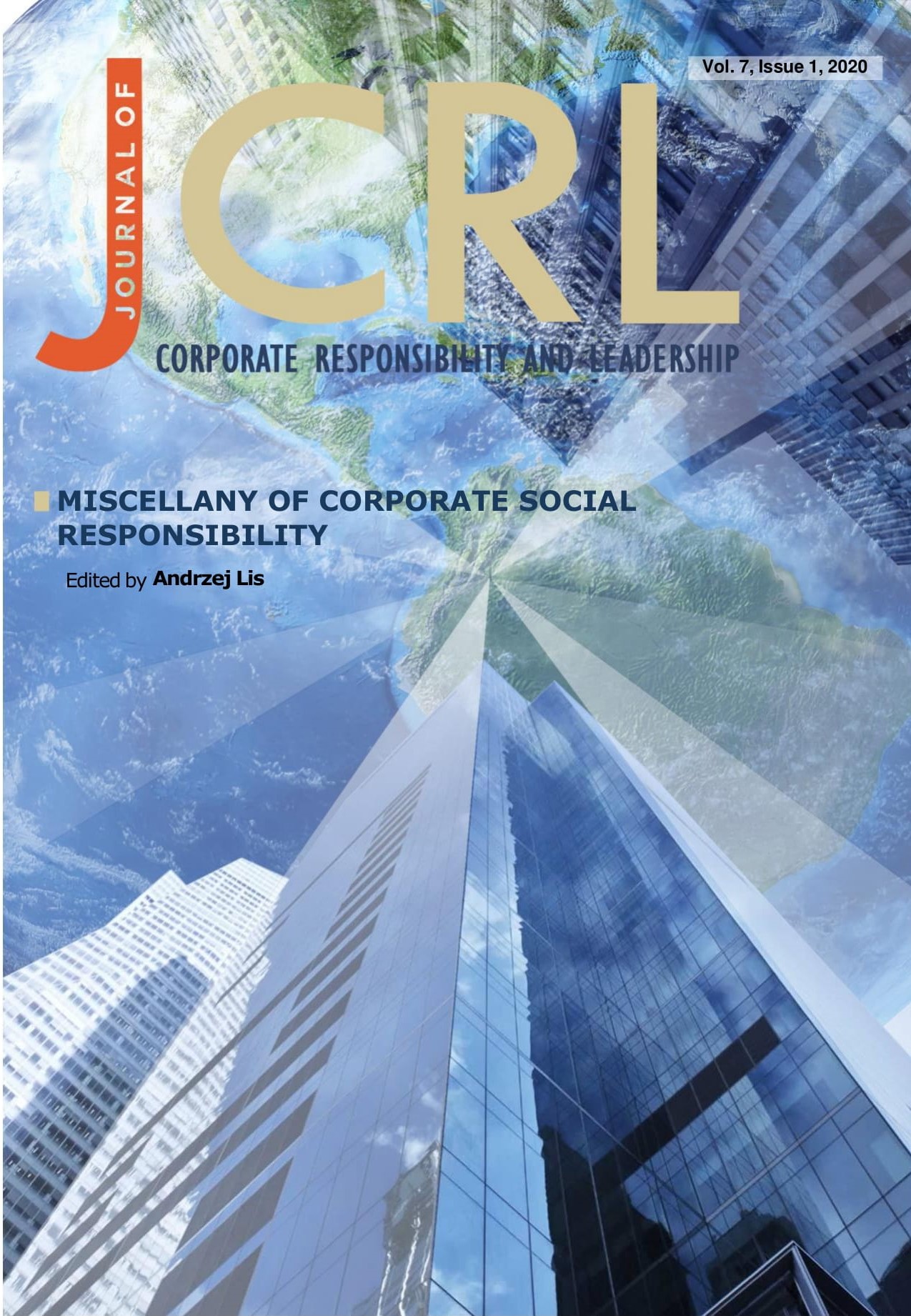Eco-innovations and Their Role in Contemporary Business
DOI:
https://doi.org/10.12775/JCRL.2020.004Keywords
eco-innovation, green innovation, CSR, innovation, systematic literature reviewAbstract
Eco-innovations become a more and more significant aspect in
management theory and business practice. The concept is considered to
be a solution linking the ideas of corporate social responsibility (CSR) and
innovation. The aim of the study is to discuss the eco-innovations concept
and their role in contemporary business. In order to meet the aim of the
paper, the following operational objectives were indicated: (1) to present
and discuss definitions of the eco-innovations concept; (2) to exemplify
different types, antecedents and dimensions of eco-innovations; (3) to
identify benefits of eco-innovations; (4) to consider eco-innovations as
a source of potential competitive advantage. This study is based on the
methodology of systematic literature review. The article exemplifies
the definitions of eco-innovations, their types, antecedents and different
dimensions. Later, it is discussed the role of eco-innovations in building
the competitive advantage. The study confirms that eco-innovations
can generate benefits for businesses and their environment. Thus, the
role of eco-innovations in contemporary business can be considered as
significant.
References
Buhl, A., Blazejewski, S., & Dittmer, F. (2016). The more, the merrier: Why and how employee-driven eco-innovation enhances environmental and competitive
advantage. Sustainability (Switzerland), 8(9).
Carrillo-Hermosilla, J., Del Río, P., & Könnölä, T. (2010). Diversity of eco-innovations: Reflections from selected case studies. Journal of Cleaner Production, 18(10–11),
-1083.
Cheng, C.C.J., Yang, C.-L., & Sheu, C. (2014). The link between eco-innovation and business performance: A Taiwanese industry context. Journal of Cleaner
Production, 64, 81-90.
Czakon, W. (2011). Metoda systematycznego przeglądu literatury. Przegląd organizacji, 3, 57-62.
Czerniachowicz, B., Lis, A., & Wieczorek-Szymańska, A. (2017). The relationships between leadership and corporate social responsibility: Systematic literature
review. Journal of Corporate Responsibility and Leadership, 4(3), 9–23.
Doran, J., & Ryan, G. (2012). Regulation and firm perception, eco-innovation and firm performance. European Journal of Innovation Management, 15(4), 421–441.
Europa INNOVA (2006). Thematic workshop, lead markets and innovation. Munich, Germany, June 2006.
European Commission (2007). Competitiveness and Innovation Framework Pogramme (2007–2013). Brussels.
European Commission (2008). Call for proposals under the eco-innovation 2008 programme. DG Environment. Retrieved from: https://ec.europa.eu/environment/
ecoap/ (accessed 10 February 2018).
Fussler, C., & James, P. (1996). Eco-innovation: A Breakthrough Discipline for Innovation and Sustainability. London: Pitman Publishing.
Ghisetti, C., Marzucchi, A., & Montresor, S. (2015). The open eco-innovation mode. An empirical investigation of eleven European countries. Research Policy, 44(5),
-1093.
Halila, F., & Rundquist, J. (2011). The development and market success of ecoinnovations: A comparative study of eco-innovations and “other” innovations in Sweden. European Journal of Innovation Management, 14(3), 278–302.
Horbach, J., Oltra, V., & Belin, J. (2013). Determinants and specificities of ecoinnovations compared to other innovations – An econometric analysis for the French and German industry based on the community innovation survey. Industry and Innovation, 20(6), 523-543.
Jansson, J. (2011). Consumer eco-innovation adoption: Assessing attitudinal factors and perceived product characteristics. Business Strategy and the Environment, 20(3), 192-210.
Józefowicz, B. (2017). Diversity management and trust: Systematic literature review. Journal of Corporate Responsibility and Leadership, 4(4), 51–68.
Kemp, R., & Pontoglio, S. (2007). Workshop conclusion on typology and framework: Measuring eco-innovation. Retrieved from https://www.researchgate.net/profile/
Maj_Andersen/publication/238691195_This_report_describes_the_outcomes_of_
the_first_workshop_of_MEI_where_researchers_met_with_people_from_the_
advisory_board_members_and_scientific_officer_Venue_AM_-_SDME_building_
of_DG_Research_Square_/links/542e82960cf29bbc126f2703.pdf (accessed 10
February 2018).
Kesidou, E., & Demirel, P. (2012). On the drivers of eco-innovations: Empirical evidence from the UK. Research Policy, 41(5), 86–-870.
Lis, A. (2019a). Leadership and corporate social responsibility: Mapping the conceptual structure of research. Journal of Corporate Responsibility and Leadership, 6(1), 7-21.
Lis, A. (2019b). Case study methodology in research on corporate social responsibility: General publication profiling and identifying research contexts. Journal of
Corporate Responsibility and Leadership, 6(2), 7–28.
Lis, A. (2020). Case study methodology in research on corporate social responsibility: Identifying core references with direct citation analysis. Journal of Corporate Responsibility and Leadership, 7(1), 7–20.
Lis, A., & Sudolska, A. (2018). W poszukiwaniu typologii innowacji społecznie odpowiedzialnych: Mapowanie pola badawczego. Studia i Prace Wydziału Nauk Ekonomicznych i Zarządzania Uniwersytetu Szczecińskiego, 52(2), 115-125.
Porter, A. L., Kongthon, A., & Lu, J.-C. C. (2002). Research profiling: Improving the literature review. Scientometrics, 53(3), 351–370.
Pujari, D. (2006). Eco-innovation and new product development: Understanding the influences on market performance. Technovation, 26(1), 7–85.
Ślęzak, M., & Jagielski, M. (2018). Manifestations and measures of frugal innovations. Journal of Corporate Responsibility and Leadership, 5(4), 81–104.
Zupic, I., & Čater, T. (2015). Bibliometric methods in management and organization. Organizational Research Methods, 18(3), 429–472.
Downloads
Published
How to Cite
Issue
Section
Stats
Number of views and downloads: 593
Number of citations: 0



